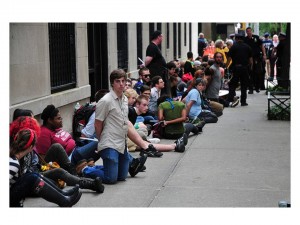 Gender inequality has maintained the suppression of women worldwide and unfortunately has impacted Sub-Saharan Africa with the greatest magnitude. Everyday in these countries are countless occurrences of physical, emotional, and psychological abuse that must be acknowledged as a primary concern for governments across the world. A prime example of gender inequality is the use of rape as a weapon of war. For women in Darfur, it is a permanent scar of war; a painful reminder which will never go away. Girls as young as eight will never sleep well again or be able to have a normal relationship with a man because of this issue. There are many ways to commit murder, and for these women and girls, they may as well be dead.
Gender inequality has maintained the suppression of women worldwide and unfortunately has impacted Sub-Saharan Africa with the greatest magnitude. Everyday in these countries are countless occurrences of physical, emotional, and psychological abuse that must be acknowledged as a primary concern for governments across the world. A prime example of gender inequality is the use of rape as a weapon of war. For women in Darfur, it is a permanent scar of war; a painful reminder which will never go away. Girls as young as eight will never sleep well again or be able to have a normal relationship with a man because of this issue. There are many ways to commit murder, and for these women and girls, they may as well be dead.
For the past five years, the Islamist government in Khartoum, Sudan has given the Janjaweed militia a free hand in putting down a rebellion by Black African tribes in the region and as a result of the conflict, some one million people have fled their homes and 50,000 people have been killed. Women, girls, and babies have been raped with impunity because the Sudanese government will not lift a finger to help these victims because according to them, no one has been raped. Most importantly, they are women and women are unworthy of notice.
However, according to Amnesty International, violence against women is occurring in a context of systematic human rights violations against civilians in Darfur. The grave violations of international human rights and humanitarian law committed by the Janjaweed and the Sudanese army against civilians have targeted men, women and children indiscriminately. Women have been summarily or indiscriminately killed, bombed, raped, tortured, abducted and forcibly displaced. Children have been summarily or indiscriminately killed, tortured, abducted and forcibly displaced; girls have, like women, been the particular target of rapes, abductions and sexual slavery.
Rape victims in Sudan are stigmatized because according to their culture, they are to blame for their attack. Along with health and tribal ramifications, there are also governmental consequences for the victims. Most victims are too afraid to report attacks because it is very hard for the government to hear a rape case. For a woman to prove rape under Sudanese law, she needs four male witnesses; a task which is essentially impossible. In his book Darfur: The Ambiguous Genocide, Gerard Prunier describes the ways women and girls are discriminated against if they admit to being raped. If a single woman is found to be a victim of rape, (or have had sex in the eyes of the government,) she would be sentenced to 100 lashes. If the same were found out about for a married women she would sentenced to be stoned to death. The government has imprisoned pregnant rape victims for adultery. (60-62)
Rape as a weapon of war has been going on for too long in long in Darfur and the end does not seem to be anytime soon. Rape is a universal fear of women all around the world. Women in Darfur are afraid to walk in daylight with other people to look for food and water because they can be snatched, beaten, and raped with a gun. Women and girls are now as likely to be assaulted in periods of calm as during attacks on their villages and towns. Young girls in America wish for tickets to the latest Hannah Montana concert or an iPod, whereas young girls in Darfur wish for security from their own government as they walk miles to search for water. The Sudanese government has said it is committed to stopping the sexual violence, but in practice, little or nothing is being done.
Another example of gender inequality in Sub-Saharan Africa is fistula and young African girls. What is a fistula? According to fistulafoundation.org, fistula is a hole between a woman’s birth passage and one or more of her internal organs. This hole develops over many days of obstructed labor, when the pressure of the baby’s head against the mother’s pelvis cuts off blood supply to delicate tissues in the region. The dead tissue falls away and the woman is left with a hole between her vagina and her bladder (called a vesicovaginal fistula or VVF) and sometimes between her vagina and rectum (rectovaginal fistula, RVF). This hole results in permanent incontinence of urine and/or feces. Women who develop fistulas are often abandoned by their husbands, rejected by their communities, and forced to live an isolated existence (http://www.fistulafoundation.org/aboutfistula/faqs.html). Fistula is also the ultimate symbol of childbirth gone wrong because of poor health care access and the high prevalence of men marrying under-age girls in Sub-Saharan Africa.
In a land where boys are more valued than girls, girls are viewed as nothing more than as bargaining tools for their fathers who covet fat dowries. Their mothers are powerless to intervene and as a result many African girls have been sold into marriage to men old enough to be their grandfathers. At the age of twelve, most little girls bodies are not ready for childbirth and an obstructed labor combined with the narrow hips of child will lead to many occurrences of fistula in Sub-Saharan Africa.
Prevention comes in the form of access to obstetrical care, support from trained health care professionals throughout pregnancy, providing access to family planning, promoting the practice of spacing between births, supporting women in education and most importantly, postponing early marriage (http://en.wikipedia.org/wiki/Obstetric_fistula).
The last example of gender inequality in Sub-Saharan Africa is female genital mutilation. The practice of female genital mutilation, also known as female circumcision, occurs throughout the world, but it is most common in Africa. Female genital mutilation is a tradition and social custom to keep a young girl pure and a married woman faithful. In Sub-Saharan Africa it is practiced in the majority of the continent including Kenya, Nigeria, Mali, Upper Volta, Ivory Coast, Egypt, Mozambique and Sudan. It is a cross-cultural and cross-religious ritual, which is performed by Muslims, Coptic Christians, Protestants, Catholics and members of various indigenous groups (Skaine 15).
 Female genital mutilation is usually performed on girls before they reach puberty. It is a procedure where either part or the entire clitoris is surgically removed leaving a reduced or total lack of sexual feeling. This procedure is an attempt to reduce the sex drive of women, making them less likely to be sexually active before marriage or engage in extra-marital affairs. Over eighty million women and girls are living with or somehow affected by female genital mutilation (World Medical Association), but as the world moves forward into an age of women’s rights and global responsibility, it is time to take a stand against this ruthless violation of human rights.
Female genital mutilation is usually performed on girls before they reach puberty. It is a procedure where either part or the entire clitoris is surgically removed leaving a reduced or total lack of sexual feeling. This procedure is an attempt to reduce the sex drive of women, making them less likely to be sexually active before marriage or engage in extra-marital affairs. Over eighty million women and girls are living with or somehow affected by female genital mutilation (World Medical Association), but as the world moves forward into an age of women’s rights and global responsibility, it is time to take a stand against this ruthless violation of human rights.
The female is operated on while in a sitting position or lying on her back with her thighs being held apart. The operator uses a cutting instrument, a collection of thorns for suturing the wound, and a powder mixture of sugar, gum, and other herbs, ashes or pulverized animal manure, which is later applied to control excessive hemorrhaging. The child is in so much pain that some have actually bitten their tongues off. If the child faints, powder is blown up her nose to revive her. When the operation is completed, usually within fifteen minutes, the wound is closed and the women present are allowed to inspect the wound to ensure that the procedure was properly completed. Finally, the girl is sutured and the powder mixture is applied. The girl must then remain immobilized for up to three weeks in order to heal properly (Skaine 25).
This practice is both sexist and invasive. The genitals of young boys are not operated on crudely to keep them pure so why should young girls have to submit themselves to such a painful and humiliating act? Because they are females and total control of a woman’s life must be achieved, even at the expense of her mental and physical health.
These are some of the many gender issues that plague the lives of women who reside in Sub-Saharan Africa. These issues must be eradicated in order for African women have total control over their lives, a control that women in the West take for granted. In Sub-Saharan Africa, women have little or no rights. This affects what they can do for work, how their family life is, and what future they have. Until the world’s governments decide to take a stand on these issues, little or nothing will be done to help these women.
Gender Issues in Sub-Saharan Africa ,



